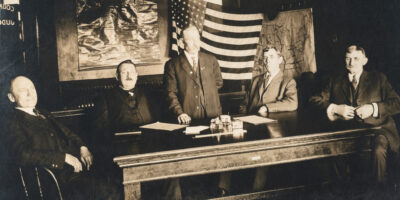“The Gold Standard: A Principled Case”
“In recent months, we have witnessed fierce arguments between, on the one side, those who defend the current system of “fiat money,” in which, as John Maynard Keynes stated, money “is created and issued by the State, but is not convertible by law into anything other than itself, and has no fixed value in terms of an objective standard,” and, on the other, those who support a return to the gold standard or even privatized money.
It is important to remember that monetary policy reflects the state’s choice to prioritize one set of economic possibilities (e.g., long-term monetary stability) over other options (e.g., the government’s ability to use its money-supply monopoly to bolster employment during recessions). These trade-offs, however, don’t just involve technical economic arguments. They also come down to questions of principle.” Read more.
“The Gold Standard: A Principled Case”
Samuel Gregg
The Witherspoon Institute, July 20, 2010.
Image by Salvatore Vuono / FreeDigitalPhotos.net.







